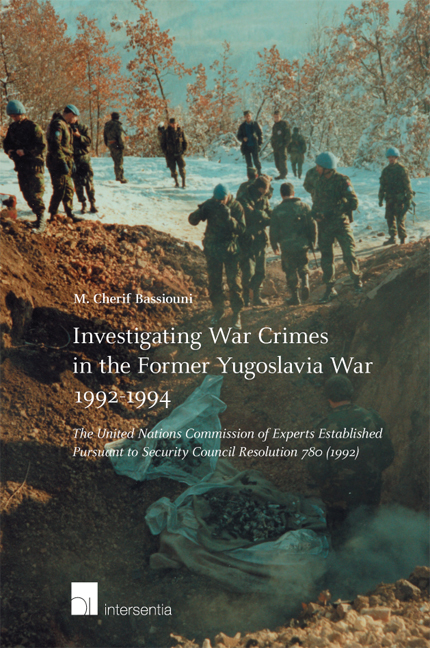 Investigating War Crimes in the Former Yugoslavia War 1992–1994
Investigating War Crimes in the Former Yugoslavia War 1992–1994 Book contents
- Frontmatter
- Contents
- Dedication
- About this Book
- About the Author
- Acknowledgement
- Table of Abbreviations
- Table of Authorities
- Chapter I Background on the Conflict in the Former Yugoslavia
- Chapter II Some Pictorial Descriptions
- Chapter III An Overview of the Realpolitik and the Workings of the Commission of Experts
- Chapter IV Precedents Leading to United Nations Security Council Resolution 780 (1992)
- Chapter V The Commission of Experts’ Establishment and Processes
- Chapter VI Final Report of the Commission of Experts Established Pursuant to Security Council Resolution 780 (1992) and Annex Summaries and Conclusions
- Chapter VII The Absence of a Transition between the Commission of Experts and the ICTY
- Chapter VIII Experiences that Affected Me the Most During My Tenure on the Commission of Experts
- Chapter IX Concluding Reflections
Chapter IV - Precedents Leading to United Nations Security Council Resolution 780 (1992)
Published online by Cambridge University Press: 12 October 2018
- Frontmatter
- Contents
- Dedication
- About this Book
- About the Author
- Acknowledgement
- Table of Abbreviations
- Table of Authorities
- Chapter I Background on the Conflict in the Former Yugoslavia
- Chapter II Some Pictorial Descriptions
- Chapter III An Overview of the Realpolitik and the Workings of the Commission of Experts
- Chapter IV Precedents Leading to United Nations Security Council Resolution 780 (1992)
- Chapter V The Commission of Experts’ Establishment and Processes
- Chapter VI Final Report of the Commission of Experts Established Pursuant to Security Council Resolution 780 (1992) and Annex Summaries and Conclusions
- Chapter VII The Absence of a Transition between the Commission of Experts and the ICTY
- Chapter VIII Experiences that Affected Me the Most During My Tenure on the Commission of Experts
- Chapter IX Concluding Reflections
Summary
The establishment of the Commission of Experts, whose work is at the heart of this book, was the result of months of discussions at the Security Council before its adoption.
By late 1991, a large portion of the former Yugoslavia witnessed high levels of violence and an increasingly obvious ethnic conflict. The internationally community became increasingly concerned about the escalating conflict and its potential to undermine international peace and security. After many states expressed their concern regarding the ongoing violence in the region and the European Community issued numerous statements condemning the violence throughout the summer and early fall of 1991, on September 1, 1991 the major parties to the conflict entered into a cease-fire agreement in Belgrade. It was, however, short lived and fighting resumed quickly. Another cease-fire agreement was negotiated in mid-September with the help of Lord Peter Carrington, who was working to help mediate the conflict at the request of the European Community. Once again, the agreement did not last.
Then on September 25, 1991, the UN Security Council unanimously adopted Resolution 713 (1992), which established a complete embargo on the sale of weapons and military equipment to Yugoslavia. A few weeks later, on October 18, 1991, in The Hague at the Peace Convention on Yugoslavia: Arrangements for General Settlement, followed by the Peace Conference on Yugoslavia: Treaty Provisions for the Convention also held in The Hague on November 1, 1991, Carrington proposed draft documents regarding the protection of human rights and calling for the establishment of autonomous regions in locations where a minority ethnic group was dominate. While five of the six republics that made up Yugoslavia, namely Bosnia-Herzegovina, Croatia, Macedonia, Montenegro and Slovenia, agreed to the arrangement, it was rejected by the sixth republic, Serbia, on November 5. That same month, Cyrus Vance, then the personal envoy for Secretary-General Javier Pérez de Cuéllar, met with the presidents of Serbia and Croatia, the Secretary of State for National Defense for Yugoslavia, and Lord Peter Carrington in Geneva on November 23, 1991, where a cease-fire agreement was signed by all parties that expressed desire for the establishment of a UN peace-keeping operation. The cease-fire agreement, known as the Geneva Agreement, broke down within days.
- Type
- Chapter
- Information
- Investigating War Crimes in the Former Yugoslavia War 1992–1994The United Nations Commission of Experts Established Pursuant to Security Council Resolution 780 (1992), pp. 119 - 124Publisher: IntersentiaPrint publication year: 2017
